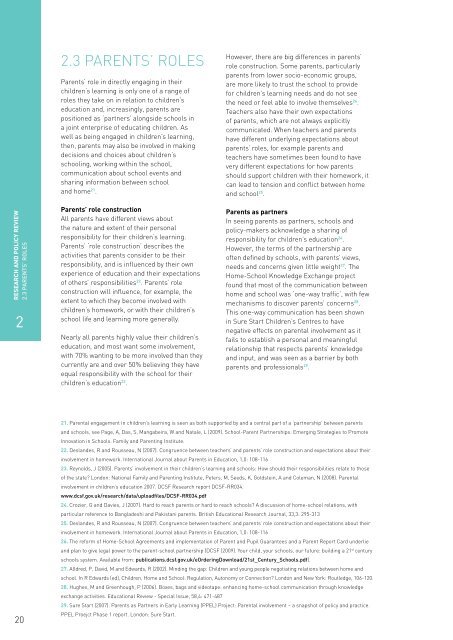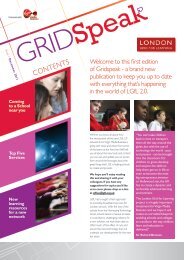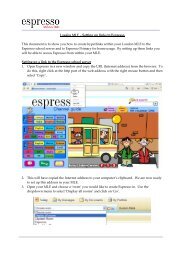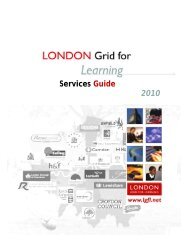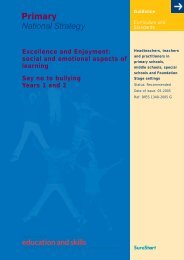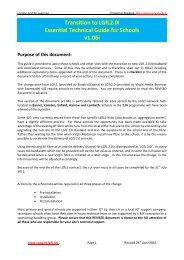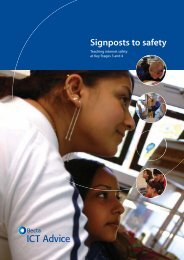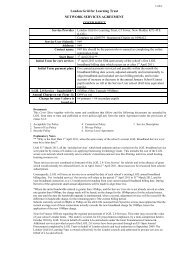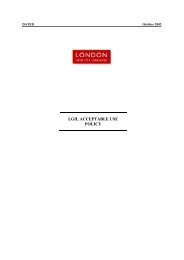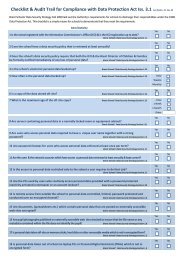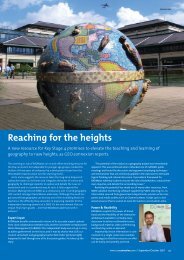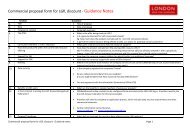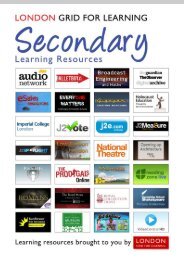Developing the home-school relationship using digital ... - Futurelab
Developing the home-school relationship using digital ... - Futurelab
Developing the home-school relationship using digital ... - Futurelab
- No tags were found...
Create successful ePaper yourself
Turn your PDF publications into a flip-book with our unique Google optimized e-Paper software.
2.3 PARENTS’ ROLESParents’ role in directly engaging in <strong>the</strong>irchildren’s learning is only one of a range ofroles <strong>the</strong>y take on in relation to children’seducation and, increasingly, parents arepositioned as ‘partners’ alongside <strong>school</strong>s ina joint enterprise of educating children. Aswell as being engaged in children’s learning,<strong>the</strong>n, parents may also be involved in makingdecisions and choices about children’s<strong>school</strong>ing, working within <strong>the</strong> <strong>school</strong>,communication about <strong>school</strong> events andsharing information between <strong>school</strong>and <strong>home</strong> 21 .However, <strong>the</strong>re are big differences in parents’role construction. Some parents, particularlyparents from lower socio-economic groups,are more likely to trust <strong>the</strong> <strong>school</strong> to providefor children’s learning needs and do not see<strong>the</strong> need or feel able to involve <strong>the</strong>mselves 24 .Teachers also have <strong>the</strong>ir own expectationsof parents, which are not always explicitlycommunicated. When teachers and parentshave different underlying expectations aboutparents’ roles, for example parents andteachers have sometimes been found to havevery different expectations for how parentsshould support children with <strong>the</strong>ir <strong>home</strong>work, itcan lead to tension and conflict between <strong>home</strong>and <strong>school</strong> 25 .RESEARCH AND POLICY REVIEW2.3 PARENTS’ ROLES2Parents’ role constructionAll parents have different views about<strong>the</strong> nature and extent of <strong>the</strong>ir personalresponsibility for <strong>the</strong>ir children’s learning.Parents’ ‘role construction’ describes <strong>the</strong>activities that parents consider to be <strong>the</strong>irresponsibility, and is influenced by <strong>the</strong>ir ownexperience of education and <strong>the</strong>ir expectationsof o<strong>the</strong>rs’ responsibilities 22 . Parents’ roleconstruction will influence, for example, <strong>the</strong>extent to which <strong>the</strong>y become involved withchildren’s <strong>home</strong>work, or with <strong>the</strong>ir children’s<strong>school</strong> life and learning more generally.Nearly all parents highly value <strong>the</strong>ir children’seducation, and most want some involvement,with 70% wanting to be more involved than <strong>the</strong>ycurrently are and over 50% believing <strong>the</strong>y haveequal responsibility with <strong>the</strong> <strong>school</strong> for <strong>the</strong>ir children’s education 23 . Parents as partnersIn seeing parents as partners, <strong>school</strong>s andpolicy-makers acknowledge a sharing ofresponsibility for children’s education 26 .However, <strong>the</strong> terms of <strong>the</strong> partnership areoften defined by <strong>school</strong>s, with parents’ views,needs and concerns given little weight 27 . TheHome-School Knowledge Exchange projectfound that most of <strong>the</strong> communication between<strong>home</strong> and <strong>school</strong> was ‘one-way traffic’, with fewmechanisms to discover parents’ concerns 28 .This one-way communication has been shownin Sure Start Children’s Centres to havenegative effects on parental involvement as itfails to establish a personal and meaningful<strong>relationship</strong> that respects parents’ knowledgeand input, and was seen as a barrier by bothparents and professionals 29 .2021. Parental engagement in children’s learning is seen as both supported by and a central part of a ‘partnership’ between parentsand <strong>school</strong>s, see Page, A, Das, S, Mangabeira, W and Natale, L (2009). School-Parent Partnerships: Emerging Strategies to PromoteInnovation in Schools. Family and Parenting Institute.22. Deslandes, R and Rousseau, N (2007). Congruence between teachers’ and parents’ role construction and expectations about <strong>the</strong>irinvolvement in <strong>home</strong>work. International Journal about Parents in Education, 1,0: 108-11623. Reynolds, J (2005). Parents’ involvement in <strong>the</strong>ir children’s learning and <strong>school</strong>s: How should <strong>the</strong>ir responsibilities relate to thoseof <strong>the</strong> state? London: National Family and Parenting Institute, Peters, M, Seeds, K, Goldstein, A and Coleman, N (2008). Parentalinvolvement in children’s education 2007. DCSF Research report DCSF-RR034.www.dcsf.gov.uk/research/data/uploadfiles/DCSF-RR034.pdf24. Crozier, G and Davies, J (2007). Hard to reach parents or hard to reach <strong>school</strong>s? A discussion of <strong>home</strong>-<strong>school</strong> relations, withparticular reference to Bangladeshi and Pakistani parents. British Educational Research Journal, 33,3: 295-31325. Deslandes, R and Rousseau, N (2007). Congruence between teachers’ and parents’ role construction and expectations about <strong>the</strong>irinvolvement in <strong>home</strong>work. International Journal about Parents in Education, 1,0: 108-11626. The reform of Home-School Agreements and implementation of Parent and Pupil Guarantees and a Parent Report Card underlieand plan to give legal power to <strong>the</strong> parent-<strong>school</strong> partnership (DCSF (2009). Your child, your <strong>school</strong>s, our future: building a 21 st century<strong>school</strong>s system. Available from: publications.dcsf.gov.uk/eOrderingDownload/21st_Century_Schools.pdf).27. Alldred, P, David, M and Edwards, R (2002). Minding <strong>the</strong> gap: Children and young people negotiating relations between <strong>home</strong> and<strong>school</strong>. In R Edwards (ed), Children, Home and School: Regulation, Autonomy or Connection? London and New York: Routledge, 106-120.28. Hughes, M and Greenhough, P (2006). Boxes, bags and videotape: enhancing <strong>home</strong>-<strong>school</strong> communication through knowledgeexchange activities. Educational Review - Special Issue, 58,4: 471-48729. Sure Start (2007). Parents as Partners in Early Learning (PPEL) Project: Parental involvement – a snapshot of policy and practice.PPEL Proejct Phase 1 report. London: Sure Start.


